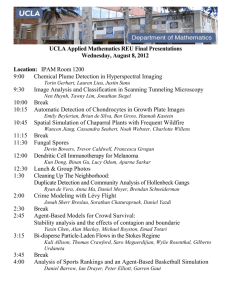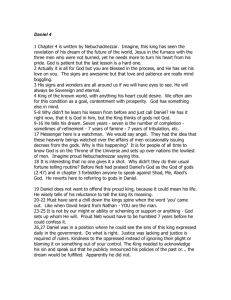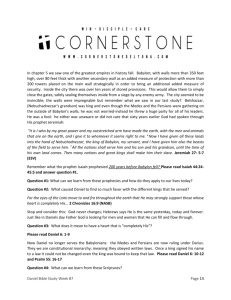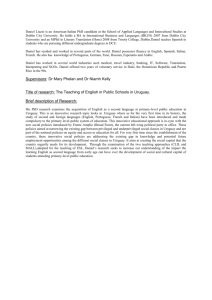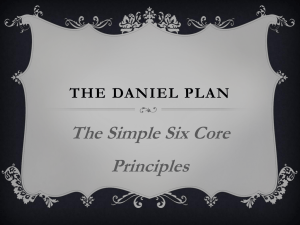The Chaldeans - Bible Studying.NET
advertisement
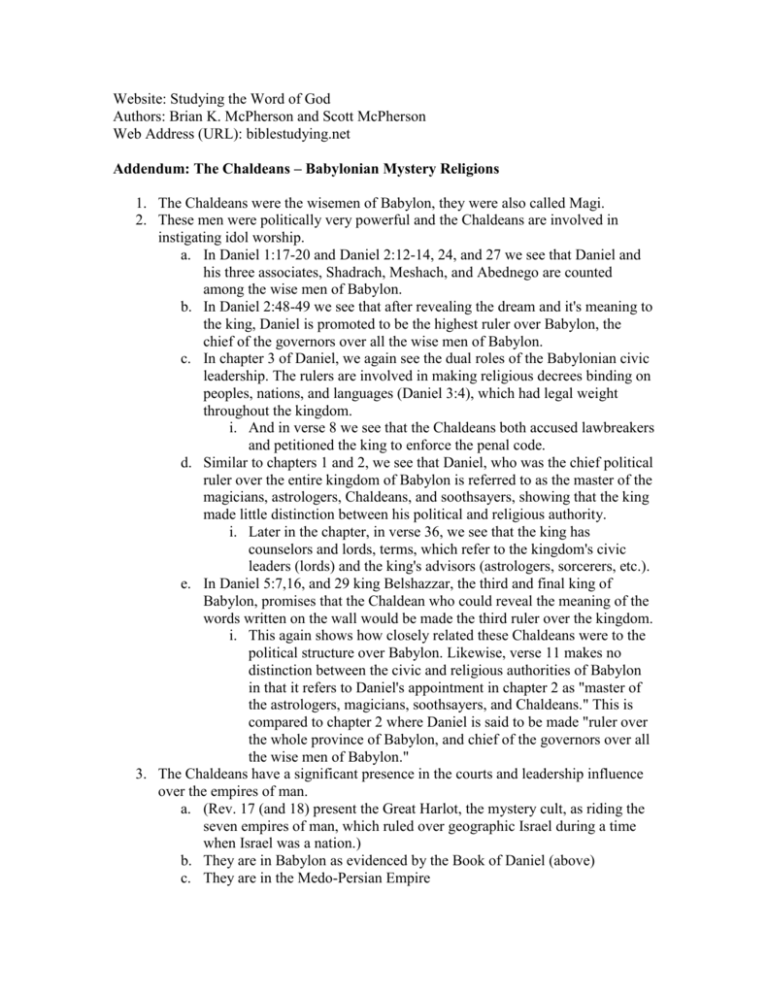
Website: Studying the Word of God
Authors: Brian K. McPherson and Scott McPherson
Web Address (URL): biblestudying.net
Addendum: The Chaldeans – Babylonian Mystery Religions
1. The Chaldeans were the wisemen of Babylon, they were also called Magi.
2. These men were politically very powerful and the Chaldeans are involved in
instigating idol worship.
a. In Daniel 1:17-20 and Daniel 2:12-14, 24, and 27 we see that Daniel and
his three associates, Shadrach, Meshach, and Abednego are counted
among the wise men of Babylon.
b. In Daniel 2:48-49 we see that after revealing the dream and it's meaning to
the king, Daniel is promoted to be the highest ruler over Babylon, the
chief of the governors over all the wise men of Babylon.
c. In chapter 3 of Daniel, we again see the dual roles of the Babylonian civic
leadership. The rulers are involved in making religious decrees binding on
peoples, nations, and languages (Daniel 3:4), which had legal weight
throughout the kingdom.
i. And in verse 8 we see that the Chaldeans both accused lawbreakers
and petitioned the king to enforce the penal code.
d. Similar to chapters 1 and 2, we see that Daniel, who was the chief political
ruler over the entire kingdom of Babylon is referred to as the master of the
magicians, astrologers, Chaldeans, and soothsayers, showing that the king
made little distinction between his political and religious authority.
i. Later in the chapter, in verse 36, we see that the king has
counselors and lords, terms, which refer to the kingdom's civic
leaders (lords) and the king's advisors (astrologers, sorcerers, etc.).
e. In Daniel 5:7,16, and 29 king Belshazzar, the third and final king of
Babylon, promises that the Chaldean who could reveal the meaning of the
words written on the wall would be made the third ruler over the kingdom.
i. This again shows how closely related these Chaldeans were to the
political structure over Babylon. Likewise, verse 11 makes no
distinction between the civic and religious authorities of Babylon
in that it refers to Daniel's appointment in chapter 2 as "master of
the astrologers, magicians, soothsayers, and Chaldeans." This is
compared to chapter 2 where Daniel is said to be made "ruler over
the whole province of Babylon, and chief of the governors over all
the wise men of Babylon."
3. The Chaldeans have a significant presence in the courts and leadership influence
over the empires of man.
a. (Rev. 17 (and 18) present the Great Harlot, the mystery cult, as riding the
seven empires of man, which ruled over geographic Israel during a time
when Israel was a nation.)
b. They are in Babylon as evidenced by the Book of Daniel (above)
c. They are in the Medo-Persian Empire
i. In Daniel 6, though the Babylonian kingdom has been conquered
by the Medes, we find that Darius the Mede, keeps Daniel as the
first of three governors over the 120 provinces of the kingdom.
1. In Daniel 6:7 we are told that the rulers and counselors
consulted together and issued a royal decree, a religious
law which was considered to be a law of the Medes and
Persians. This law is religious in nature. They then
petitioned the king to sign the decree and enact the law.
2. Just as the Chaldeans did in chapter 3, these men accuse
Daniel of breaking this law before the king and demand
that Daniel be punished in accordance with it. From the
similarities in these events it does not seem unwarranted to
suppose that many of these men may have been the same
people who first tried this maneuver against Shadrach,
Meshach, and Abednego in chapter 3.
ii. The Book of Esther records that the Persian king Artaxerxes (or
Ahasuerus) was, like Pharoah, Nebuchadnezzar, Belshazzar, and
Darius before him, surrounded by magicians and wise men.
1. Esther 1:13 Then the king said to the wise men, which
knew the times, (for so was the king's manner toward
all that knew law and judgment: 14 And the next unto
him was Carshena, Shethar, Admatha, Tarshish, Meres,
Marsena, and Memucan, the seven princes of Persia and
Media, which saw the king's face, and which sat the first in
the kingdom;) 15 What shall we do unto the queen
Vashti according to law, because she hath not performed
the commandment of the king Ahasuerus by the
chamberlains? 16 And Memucan answered before the king
and the princes, Vashti the queen hath not done wrong to
the king only, but also to all the princes, and to all the
people that are in all the provinces of the king
Ahasuerus.
2. The Book of Esther informs us that:
a. these magicians survived into the kingdom of
Artaxerxes of Persia
b. these men were among the highest in the kingdom
and among the most important of the king's court
(Esther 1:1-3, 13-14).
c. these men were were involved in politics and had
much influence over legal matters (Esther 1:13, 8,
15-16).
d. like in Daniel, these men were entrusted to uphold
the law and advise the king on punishment.
e. these men were said to "know the times."
f. one of the chiefs of these men named Haman gets
king Artaxerxes to enact a law calling for the
destruction of the Jews.
i. Haman's motive and the approach are very
similar to those of the Chaldeans in Daniel 3
and 6. In both cases the reason that God's
people were persecuted is because they
didn't keep the laws of the king.
ii. in Esther, Mordecai the Jew would not bow
down to Haman for the same reason that
Daniel, Shadrach, Meshach, and Abednego
would not bow down in the Book of Daniel.
d. It is present in Greece
i. Greek mystery religion was called Gnosticism and existed before it
fused itself in Christian theology and expressed itself in Christian
terminology.
ii. It had its roots in and relates to Platonism
iii. Its centers of influence were Athens, Greece and Alexandria,
Egypt (Aristotle)
iv. It was this form of the mystery religion that the NT Church and
Apostles were battling against.
v. "Mysteries - in Greek and Roman religion, some important
secret cults...Individuals sought a more emotional religion that
would fulfill their desires for personal salvation and immortality.
Secret societies were formed, usually headed by a priest or a
hierophant. By the 5th cent. B.C. mysteries were an important
part of the fabric of Hellenic life. Although the mystic rites
were kept secret, it was known that they required elaborate
initiations, including purification rites, beholding sacred objects,
accepting occult knowledge, and acting out a sacred drama. Some
mysteries were of foreign origin, such as the Middle Eastern
cults of Cybele, Isis, and Mithra;...The popularity of mystery
cults spread in the Hellenistic age and still more widely in
Roman times." - encyclopedia.com
e. It is present in Rome
i. Peter refers to Rome as Babylon in his second Epistle – 1 Peter
5:13
ii. The Magi come from the east after seeing the star of the king of
Jews –
1. Matthew 2:1 Now when Jesus was born in Bethlehem of
Judaea in the days of Herod the king, behold, there came
wise men from the east to Jerusalem, 2 Saying, Where is
he that is born King of the Jews? for we have seen his
star in the east, and are come to worship him… 9 When
they had heard the king, they departed; and, lo, the
star, which they saw in the east, went before them, till it
came and stood over where the young child was.
2. 3097 magos {mag'-os}
of foreign origin 07248; TDNT - 4:356,547; n m
AV - wise man 4, sorcerer 2; 6
1) a magus
1a) the name given by the Babylonians (Chaldeans),
Medes, Persians, and others, to the wise men, teachers,
priests, physicians, astrologers, seers, interpreters of
dreams, augers, soothsayers, sorcerers etc.
1b) the oriental wise men (astrologers) who, having
discovered by the rising of a remarkable star that the
Messiah had just been born, came to Jerusalem to worship
him
1c) a false prophet and sorcerer
3. this is their ability to know the times, which Dan. 2
describes as their ability to know when kings are set up and
thrown down,
4. which only God does and they do this through astrology.
f. It was present in Egypt
i. They were present in Joseph’s time
1. Ge 41:8 And it came to pass in the morning that his spirit
was troubled; and he sent and called for all the magicians
of Egypt, and all the wise men thereof: and Pharaoh told
them his dream; but there was none that could interpret
them unto Pharaoh.
2. Compare Joseph’s promotion and Daniel’s
ii. The worked against Moses and Aaron
1. Ex 7:11 Then Pharaoh also called the wise men and the
sorcerers: now the magicians of Egypt, they also did in
like manner with their enchantments.
2. Ex 7:22 And the magicians of Egypt did so with their
enchantments: and Pharaoh's heart was hardened, neither
did he hearken unto them; as the LORD had said.
3. Ex 8:7 And the magicians did so with their enchantments,
and brought up frogs upon the land of Egypt.
4. Compare these Egyptians with the Chaldeans and with the
False Prophet
a. 2 Tim. 3:7 – Paul describes false prophets/teachers
in the Church by comparing them with these
Egyptian sorcerers and places them in the last times
g. It was present in Assyria
i. Nahum 3:1 Woe to the bloody city! it is all full of lies and
robbery; the prey departeth not;...4 Because of the multitude of
the whoredoms of the wellfavoured harlot, the mistress of
witchcrafts, that selleth nations through her whoredoms, and
families through her witchcrafts. 5 Behold, I am against thee, saith
the LORD of hosts; and I will discover thy skirts upon thy face,
and I will shew the nations thy nakedness, and the kingdoms thy
shame. 6 And I will cast abominable filth upon thee, and make thee
vile, and will set thee as a gazingstock. 7 And it shall come to pass,
that all they that look upon thee shall flee from thee, and say,
Nineveh is laid waste: who will bemoan her? whence shall I seek
comforters for thee?
ii. Nineveh was the capitol city of the Assyrian empire.
iii. Look at all the similar descriptions Nahum provides for Assyria
and Nineveh that are nearly identical to those found in Revelation
17 and 18.
1. Both are called harlots (Nahum 3:4, Revelation 17:1, 5, 15,
17).
2. Both deal in witchcraft (Nahum 3:4) or sorcery (Revelation
18:23).
3. Both are made naked (Nahum 3:5, Revelation 17:16).
4. Both are associated with lies and deception (Nahum 3:1,
Revelation 18:23).
5. Both are associated with blood (Nahum 3:1, Revelation
17:6, 18:20, 24).
6. And both are laid waste as a punishment (Nahum 3:7,
Revelation 17:16, 18:19).
h. Conclusion:
i. “Mystery Babylon, the Great Harlot” is a moving entity
1. It’s in Ninevah, the Assyria capitol
2. It’s in historical Babylon
3. It’s in Rome
4. Beliefs of the Babylonian Chaldeans
a. The Chaldeans held secret knowledge and were able to reveal hidden
mysteries.
i. The Chaldeans were known as those who understood secret things,
and who could reveal mysteries.
ii. The Chaldeans are sought after for their secret knowledge no less
than 3 times in the Book of Daniel (Daniel 2:2, Daniel 4:6, Daniel
5:7).
iii. Of these instances Daniel 2 provides for us the most in depth look
at these men and their involvement in secret knowledge.
b. From Daniel 2 we can conclude the following regarding the Chaldeans
and their religious teaching (all of which will become important later
when we cover mystery cults in greater detail):
i. 1. They believed in a plurality of gods.
ii. 2. They believed that the gods did not dwell in flesh.
1. Daniel 2:11 And it is a rare thing that the king requireth,
and there is none other that can shew it before the king,
except the gods, whose dwelling is not with flesh.
iii. 3. They believed in a hierarchy of gods.
iv. 4. They believed that higher gods could reveal deeper truths and
hidden mysteries. The greater the god that the wise men served, the
greater the secret knowledge that their god could reveal to them.
v. 5. They believed that man could ascend to divinity through the
acquisition of secret knowledge from his god.
1. Daniel 2:46 Then the king Nebuchadnezzar fell upon his
face, and worshipped Daniel, and commanded that they
should offer an oblation and sweet odours unto him. 47
The king answered unto Daniel, and said, Of a truth it is,
that your God is a God of gods, and a Lord of kings, and
a revealer of secrets, seeing thou couldest reveal this
secret. 48 Then the king made Daniel a great man, and
gave him many great gifts, and made him ruler over the
whole province of Babylon, and chief of the governors
over all the wise men of Babylon.
5. Compare these beliefs to those of the Gnostics
a. "Gnosticism, dualistic religious and philosophical movement of the late
Hellenistic and early Christian eras. The term designates a wide
assortment of sects, numerous by the 2d cent. A.D.; they all promised
salvation through an occult knowledge that they claimed was revealed
to them alone. Scholars trace these salvation religions back to such
diverse sources as Jewish mysticism, Hellenistic mystery cults, Iranian
religious dualism (see Zoroastrianism), and Babylonian and Egyptian
mythology. The definition of gnosis [knowledge] as concern with the
Eternal was already present in earlier Greek philosophy, although its
connection with the later Gnostic movement is distant at best...Some
Gnostics taught that the world is ruled by evil archons, among them
the deity of the Old Testament, who hold captive the spirit of humanity.
The heavenly pleroma was the center of the divine life, and Jesus was
interpreted as an intermediary eternal being, or aeon, sent from the
pleroma to restore the lost knowledge of humanity's divine origin.
Gnostics held secret formulas, which they believed would free them at
death from the evil archons and restore them to their heavenly
abode." - encyclopedia.com
b. The Columbia Encyclopedia, Sixth Edition, 2001, provides us with the
following information about Gnosticism and its beliefs.
i. 1. "The heavenly pleroma was the center of the divine life, and
Jesus was interpreted as an intermediary eternal being, or aeon,
sent from the pleroma to restore the lost knowledge of humanity's
divine origin."
ii. 2. Gnosticism "promised salvation through an occult knowledge
that they claimed was revealed to them alone."
iii. 3. "Gnostics held secret formulas, which they believed would free
them at death from the evil archons and restore them to their
heavenly abode."
iv. 4. "Gnosticism held that human beings consist of flesh, soul, and
spirit (the divine spark), and that humanity is divided into classes
representing each of these elements. The purely corporeal (hylic)
lacked spirit and could never be saved; the Gnostics proper
(pneumatic) bore knowingly the divine spark and their salvation
was certain;"
c. So, Both the Gnostics and the Babylonians (Chaldeans) believed:
i. 1.in a plurality of gods. (Daniel 2:11, 47)
ii. 2.that the gods do not dwell in the flesh. (Daniel 2:11, 47)
iii. 3.that the gods reveal secrets to men. (Daniel 2:11, 47)
iv. 4.that through understanding deep mysteries and secrets a man
could ascend to divinity. (Daniel 2:46 - Nebuchadnezzar worships
Daniel because Daniel could reveal the secret meaning of the
dream.)
v. 5. in a heirarchy of ascending superiority of gods from the supreme
god. (Daniel 2:47).
